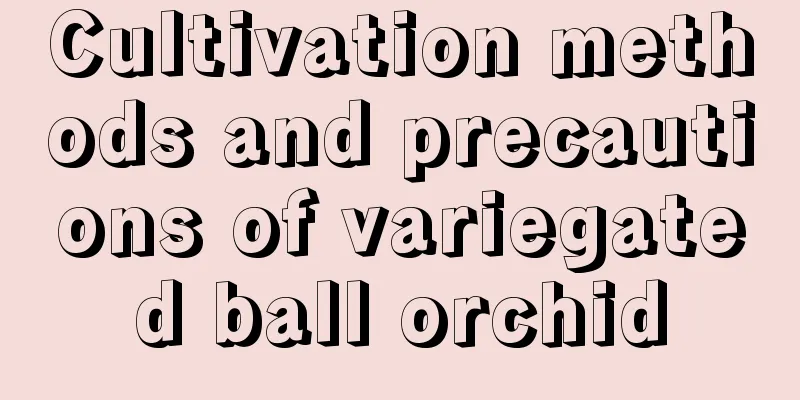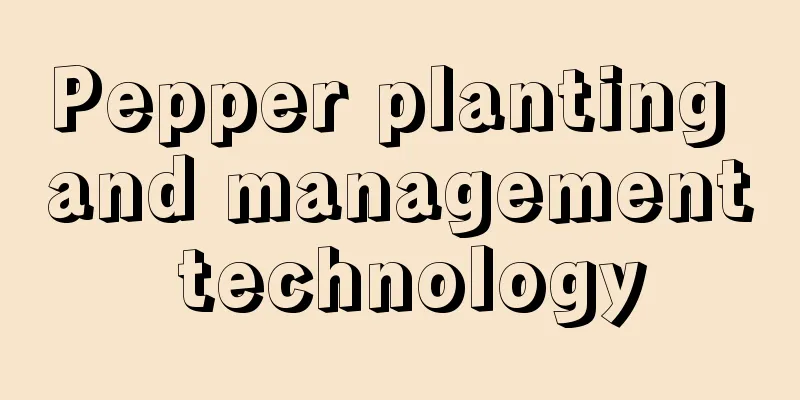Cultivation methods and precautions of variegated ball orchid

1. Maintenance methods1. Temperature: The most suitable temperature for its growth is 18-24℃. It likes a warm growing environment and can withstand a certain degree of high temperature. It can grow better at temperatures above 20℃. It is not cold-resistant, so pay attention to keep warm in winter. 2. Sunlight: It prefers a semi-shaded growing environment. Try not to let it be exposed to direct sunlight during daily cultivation. More than 3 hours of sunlight a day is enough, and it can be grown in the corner of the balcony. 3. Soil: It prefers loose, well-drained soil, preferably sandy soil. When preparing the soil, a mixture of garden soil and coarse sand is a good choice. In order to provide it with sufficient nutrients for growth, you can also add a small amount of leaf mold to the soil. 4. Water: From the moment it enters the growth period, you must provide it with sufficient water and try to keep the soil moist. Do not water it directly with tap water. It is best to dry it in the sun for two days. 2. Breeding techniques1. Reproduction: The simplest method is layering propagation. Layering propagation is to choose a relatively strong branch, and then press the part close to the top into the soil, keep the soil moist, and then cut it off for transplanting after it takes root. 2. Repotting: The variegated Hoya can be repotted all year round, but it is best to do it in the summer. The suitable temperature can allow it to adapt to the new growing environment more quickly. 3. Problem diagnosis and treatment1. Leaf spot disease: Leaf spot disease is prone to occur when the temperature is high, which provides convenient conditions for the breeding of many pathogens. When it is discovered, it is necessary to spray it with carbendazim in time. Persistent spraying will be effective. 2. Scale insects: Scale insects are pests that cause great harm to plants. When found, you can manually remove the insects. If you do not want to spray pesticides, you can cover the plants with gauze. IV. Other issues1. Is it poisonous? Many people think that the flower fragrance of the variegated Hoya is very strong and may be poisonous. In fact, it is not toxic at all. Not only that, it also has high medicinal value. 2. Can it be grown indoors: Variegated Hoya can be grown indoors. It does not require very much sunlight, so there is no problem in growing it indoors. It is also not toxic, so there is no danger in growing it normally. |
<<: Cultivation methods and precautions of white sandalwood cactus
>>: Brussels sprouts cultivation methods and precautions
Recommend
Black grass cultivation methods and precautions
1. Soil When breeding, the soil should be loose, ...
Want to do layering, cuttings, and grafting but don’t have the tools? One roll of toilet paper is enough
1. Layering Using toilet paper for high-altitude ...
How long is the growth cycle of Cistanche deserticola?
Cistanche deserticola growth introduction The cli...
How big a pot is needed for Wisteria potted plants (with potted planting methods)
1. How big is the basin? Choose the size of the f...
How to grow coral tree succulent
1. Breeding environment 1. Soil: To grow coral tr...
The Feng Shui Effect of Wine Bottle Orchid
Can promote the health of your family When growin...
Is it good to eat apples at night?
1. Inappropriate Eating apples at night is not a ...
How to manage leeks in winter?
Chives are grown in all parts of China. As the te...
How to plant money trees
Seed propagation of money tree Seed collection Wh...
How to grow Phalaenopsis in summer
Although Phalaenopsis grows in a warm environment...
How to behead Bai Feng
Beheading method Choose the location to be decapi...
How to grow ginger
1. Seed selection Choose healthy, complete, and n...
Mountain turtle planting methods and precautions
How to plant mountain tortoise Before planting th...
How to grow hydroponic daffodils
Maintenance methods During the day when there is ...
What are the plants that bloom in autumn?
Osmanthus fragrans The flowering period is from S...









